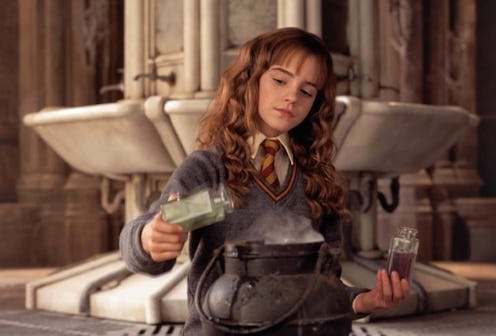Entertainment
Why 'HP's Hermione Granger Is Still So Important

The ever-eloquent Emma Watson recently spoke to Entertainment Weekly about why Hermione is so important as a feminist heroine in the Harry Potter movies, and the results were a delight. “Hermione was that perfect example of turning on its head this initial prejudice that she gets," Watson explained. "Hermione finds a way to wield her intelligence and become really the leader in this group of two other boys and that’s kind of the role that she assumes.” And this, Hermione's incredible smarts, is why she matters as both a heroine and example for the feminists of tomorrow.
Admittedly, it's not that unexpected to find a brainiac female character in a film that flirts with the action genre. After all, we had librarian Evie Carnahan (played by Rachel Weisz) in The Mummy and we had Elizabeth Swann (Keira Knightley) in the Pirates of the Caribbean series. But while these women start out in the first film of each series with an emphasis on their finding strength in their smarts, outsmarting their enemies with the value of reading or quick-thinking lies, in the sequel films they become action heroines, able to throw a punch or wield a sword against enemies man and monster.
Here's where Hermione differs. Hermione is by no means a passive character, but even her moments of action come about as a direct result of her brains. Her brains are always and forever her super power.
The obvious example of this is found in Harry Potter and the Chamber of Secrets, in which Hermione uses logic to deduce what the monster of Slytherin is: a basilisk. And, earlier in the film, it's Hermione's smarts that mean that she figures out how to discern if Malfoy is the heir that can control the basilisk; she suggests Ron and Harry take Polyjuice Potion to disguise themselves and then ask Malfoy about it. Not to mention that, generally, Harry is the better duelist, quick with his reflexes, but has a very small rotation of spells, whereas Hermione, a weaker duelist, knows a bigger variety of spells for every situation than our main hero.
Hermione's strength-through-smarts feels particularly inspiring after a few years in which portrayals of strong women on screen have been dominated by brawn over brains. Hunger Games' Katniss Everdeen is fearsome because she's strong, she can handle herself in a fight, and she's lethal with a bow and arrow. Her survival is mostly thanks to her muscles, not her brain. It's the same story for the heroine of Divergent, Tris. Tris is deliberately contrasted with her brother, Caleb, who opts to join the Erudite faction: a group of intellectuals. Tris joins Dauntless, a group who are characterized by pulling of breathtaking physical stunts. Katniss and Tris are both amazing heroines, but their worlds are characterized by the need for brawn rather than brains.
And what about Princess Merida from Brave? She's contrasted with her hyper-feminine, proper mother thanks to her love of the physical: she wants to shoot a bow and arrow, jump on a galloping horse, fight the bad guy. Again, she's wonderful, but if you're not able-bodied or you're simply not that good at sports, you might find yourself feeling a little dejected post-watching: Is this what I need to be in order to be a "strong" woman?
So if you were looking for a refresher course on resisting evil and fending for yourself and your friends purely through the most complex organ in the human body, I suggest you line up the Harry Potter films. Hermione isn't the most muscular or even the best at dueling (hi, Harry) but her intellect means, as Ron Weasley said, the heroes wouldn't last a day without her. And that's a power equally as important as being handy in a fight.